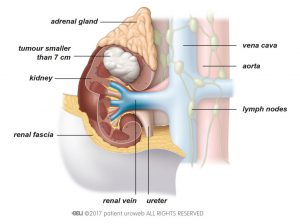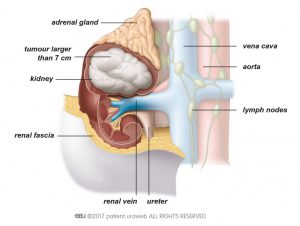Table of Contents [hide]
What is localised kidney cancer?
If you are diagnosed with localised kidney cancer, your doctor can recommend treating the cancer with partial nephrectomy, radical nephrectomy, active surveillance, radiofrequency ablation, or cryotherapy. Each procedure has its own advantages and disadvantages. The choice of treatment depends on your individual situation.
This section describes the different treatment options, which you should discuss with your doctor.
This is general information which is not specified to your individual needs. Keep in mind that situations can vary in different countries.
Treatment options for localised kidney cancer
The best option for the treatment of a kidney tumour is surgical removal.
Localised kidney cancer can be removed through either partial nephrectomy or radical nephrectomy. Both procedures can be performed by open or laparoscopic surgery. Laparoscopic surgery can also be done with the aid of a surgical robot system.
During a partial nephrectomy only the tumour is removed, leaving the healthy kidney tissue untouched. This surgery is recommended whenever possible. If it is not possible to remove the whole tumour and leave part of the kidney intact, your doctor will recommend radical nephrectomy. This means that the kidney in which the tumour is located and the surrounding tissue are completely removed.
Sometimes, surgery may not be the best option for you. This may be because of your age or medical condition, for example.
If the tumour is smaller than 4 cm, your doctor may suggest a period of active surveillance. During active surveillance, your doctor schedules regular visits to monitor the tumour. If the tumour continues to grow you may need further treatment. A good option in this case may be ablation therapy.
Ablation therapy can be either radiofrequency ablation (RFA) or cryotherapy. The aim of these procedures is to kill tumour cells by heating (RFA) or freezing (cryotherapy).
These are some topics you should discuss with your doctor when planning your treatment pathway:
- Your medical history
- If there are any cases of kidney cancer in your family
- What to consider if you only have one kidney
- Whether your kidney function is normal or if it has already been affected by other conditions like diabetes or high blood pressure
- Whether you have a tumour in one or both of your kidneys
- The kind of treatment available at your hospital
- The expertise of your doctor. Ask your doctor about his or her experience with the recommended treatment option
- Your personal preferences and values
- Support during and after treatment
Follow-up
After surgery you will meet with your doctor. In this visit, both the results of the surgery and the follow-up schedule will be discussed. Ask for a care plan so you can see how often you will need to see your doctor, and what kind of tests could be needed before each visit. This depends on the characteristics of the tumour.
Write down questions you may have before the visit. Examples of questions you can ask are:
- Is the cancer gone?
- Do I need additional treatment? If so, what options are relevant for me?
- What kind of tests do I need before the follow-up visits?
- How will the treatment and the kidney cancer affect my quality of life?
It is important that you continue to attend these visits. During these, the doctor monitors your kidney and can detect possible tumour recurrence on time. It is also important to tell your doctor if you notice any new symptoms. Do not hesitate to contact your health care team and tell them about new symptoms before the visit.



